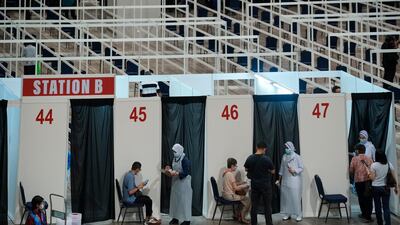Malaysian Prime Minister Muhyiddin Yassin on Monday announced an additional 40 billion ringgit ($9.70bn) stimulus package, ahead of the imposition of stricter lockdown measures this week to curb the rapid spread of Covid-19.
The South East Asian nation is seeing a surge in coronavirus infections, with the number of new daily cases greater than India's on a per capita basis.
Malaysia saw record daily infections and deaths on Saturday, though the numbers have dipped since.
The country enters a strict two-week lockdown starting on Tuesday, with only essential manufacturing and service sector allowed to operate.
"If drastic action is not taken immediately, it is of concern that the healthcare system in our country will collapse and we will face a greater catastrophe," Mr Muhyiddin said in a televised address.
The new aid package includes a 5bn ringgit fiscal injection, despite the government having limited fiscal space, he said.
Since last year, Malaysia has rolled out around 340bn ringgit in aid and stimulus measures to cushion the impact of the pandemic on the economy.
The new relief measures include 2.1bn ringgit in handouts, loan moratorium to some, grants to small and medium businesses and salary subsidies for those affected by lockdown measures, Mr Muhyiddin said.
The government will also spend 1bn ringgit to boost healthcare capacity, he said.
Malaysia's economy was on the path to recovery in the first quarter before infections began to spike.
It fell 5.6 per cent in 2020, its worst annual performance since the Asian financial crisis, but the central bank had projected growth of 6 per cent - 7.5 per cent this year.

